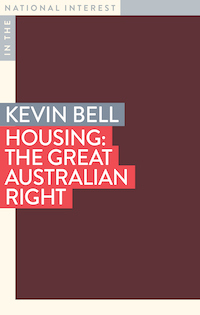Housing
An economist and a lawyer on housing
A two-part session of the ABC’s Big Ideas is devoted to housing. In the first part economist Richard Holden discusses with Alan Kohler about how, in only 20 years, the price of houses has gone from around 3 to 4 times average income, to around 6 to 8 times average income. They agree on the need to bring it back to that earlier level. In the second part Alan Kohler interviews former Supreme Court Judge Kevin Bell, on his proposition that access to housing should be a basic human right. Linking both perspectives is an observation that housing has become a financialized commodity.
Stemming housing inflation
Kohler goes through the many factors that have contributed to housing price inflation, most of which are on the demand side. He observes that housing prices took off from around the turn of the century, just after the Howard government changed the capital gains tax system to privilege short-term capital gains over long-term investment. There have been other drivers of high house prices, mainly loose monetary policy, immigration, and until 2017 banks’ easy lending standards.
Just as we have targets with dates for reducing greenhouse gas emissions, Kohler would like to see governments report on progress towards bringing houses back down to that 3 to 4 times income range. That will take time: indeed, even if it were possible to bring housing prices down quickly, that would be undesirable because a rapid fall in housing prices can have adverse consequences for the whole financial system, as we saw in the USA in 2008. and earlier in Australia in the 1890s depression.
His main comment on the politics of housing is “anything that is easy and popular won’t work”, a comment aimed particularly at some of the Coalition’s proposals. Liberal Senator Andrew Bragg explains that the Coalition would allow people to draw from their own superannuation to buy a house, and would push APRA to relax lending rules. Both measures would be inflationary because they stimulate demand without adding to supply.
Also the Coalition’s proposals would entice more people to take on more housing debt in a bubble that will eventually deflate, or perhaps even burst catastrophically if the Coalition wins office and implements its populist policies. The only beneficiaries from higher prices are the coupon clippers, such as mortgage brokers, who enrich themselves without contributing in any material way to providing housing.
Kohler notes the prevailing political wisdom that Labor’s policies on capital gains and negative gearing cost it the 2019 election, but he disagrees. It was the dopey idea of abolishing dividend imputation that tipped the scales against Labor.
He offers no easy path to reform, and there is no one measure that will bring down the price of housing. Rather, there has to be a constellation of measures to do with taxation, public finance, planning, standards, zoning, and practices in the construction industry. The main impediment to reform is the capacity of the opposition to conduct a scare campaign by misrepresenting reform proposals, as the Liberal Party did in 2019.
Kohler is author of the 2023 Quarterly Essay The great divide: Australia’s housing mess and how to fix it, covered in the roundup of 2 December 2023.
It is notable from the latest CoreLogic figures that over the 12 months to September, house prices in Sydney and Melbourne, our two hottest markets over the last twenty years, have stopped rising in real (CPI inflation-adjusted) terms. In fact in Melbourne prices have fallen by 1.4 percent in nominal terms. The title of CoreLogic’s report – Home values inch higher nationally as growth loses momentum – summarises the situation.
Housing as a right

Kevin Bell, author of Housing, the great Australian right, agrees with Kohler’s economic prescription for housing, and agrees that the market value of housing should not be the way society values housing. We build houses to provide shelter and other benefits for ourselves, not as a commodity to be traded. Housing should be seen as a basic right to be enjoyed by all Australians. It should be affordable for all – free or heavily subsidized for those without means – and it should be of adequate quality. He stresses that houses remote from people’s workplaces, requiring long commutes, do not qualify as “adequate”.
Such a way of seeing housing goes beyond basic supply and demand issues, although it is compatible with the economic principles that Kohler explains. As is the way housing is considered in many European countries, the interests of the those seeking housing should take precedence over the owners of housing. He notes that the laws protecting tenants in most European countries are much stronger than our laws.
He reminds us that in Australia we have 120 000 homeless. Many people discharged from hospital are homeless, and there are people in jail unable to be released on parole because they have no place to go to. Public policy should be directed to the complete elimination of homelessness.
Negative gearing and capital gains
Politics – Labor’s risk aversion and the media’s failure to call out the blockers
The Labor Party has the exquisite capacity to float a good idea, and make it look like a political shemozzle: 48 hours of confusion is how the ABC’s Jacob Greber describes the way the government has handled consideration of housing tax reforms.
David Speers explains that Labor has had reforms to negative gearing and capital gains tax in the bottom drawer for a long time, but in expectation of a deceitful scare campaign from the Coalition, has always been frightened to bring them out. The ABC’s Brett Worthington, constantly on the lookout for Labor’s political weakness, contrasts the Albanese government’s extreme risk aversion with the Whitlam government’s political courage, quoting Gough who commented “There are some people who are so frightened to put a foot wrong that they won’t put a foot forward.”

True to form the Coalition are making idiotic statements about a “housing tax”, and talking about how reform would hurt “mum and dad” investors, as if passing on one’s genes provides moral exculpation for avoiding tax and making housing unaffordable. We have been treated to hysterical headlines in right-wing media: “Why controversial $100 billion tax break change could impact every Aussie”, “Why Sydney and Melbourne property investors should be scared”.
That’s the dismal politics of the situation. It’s playing out in a familiar pattern. A rumour starts circulating (in this case probably a bit of routine Treasury analysis), the Coalition and the right-wing media fashion a scare campaign around the rumour, the government is caught off guard, the story becomes one about Labor fumbling, and the ABC takes the bait, amplifying that story, rather than calling out those standing in the way of reform – the Coalition and the Greens in this case.
Among ABC journalists Laura Tingle is one of the few who seems to be able to stand back and explain dispassionately the politics of housing, as she did on her regular Late Night Live session on Monday night. She makes it clear that problems in housing go back a long way, and that the Albanese government is trying to deal with the consequences of irresponsible polities put in place by the Howard-Costello government.
Economics – three reasons reform is needed
Laura Tingle in that 18-minute segment linked above, explains not only the politics but also the economics of housing.
The frame of the debate is about the extent to which negative gearing and CGT concessions have contributed to housing inflation.
The property industry has been quick to defend these concessions. They put forward the argument that removal of these concessions would see investors pulling out of the market, reducing the number of houses to rent, and thereby pushing up rents. That argument rests on the brave assumption that investors are contributing to new housing, when in fact about three-quarters of investors are buying existing housing. In a 10-minute interview economist Saul Eslake convincingly dismisses the property industry’s claims about adverse consequences from reforming housing taxes.
If the concessions were suddenly removed, some investors would probably sell, but that would increase the number of houses available to first home buyers, who are in the same pool as renters. That could allow many of them to move from renting to buying.
Critics of reform are correct in saying that removing capital gains and negative gearing concessions, by themselves, won’t fix the housing market, a point confirmed by Michelle Cull of the University of Western Sydney in her Conversation contribution: The government is reviewing negative gearing and capital gains tax, but this won’t be enough to fix our housing shortage.
That’s reasonably well-established, but those calling for reform of those concessions are making three broader points, about the way the concessions have contributed to the commodification of housing, about how they have distorted incentives and rewards for small and naïve investors, and how they have worsened wealth disparities. In all three areas, although most discussion is about “negative gearing”, it’s probably the treatment of capital gains taxation that has done the most damage.
1. Commodification of housing
The commodification of housing – the way housing has become separated from its function as something all Australians can enjoy and has become a financial asset to be bought and sold for speculation – is covered in the post above covering the contributions of Alan Kohler and Kevin Bell. From time immemorial we have built houses to live in, not to trade, but that understanding was broken by the 1999 “reforms” of the Howard government.
That commodification of housing, as some financial asset to be bought and sold with the same indifference as one may trade a parcel of BHP shares, means that housing has become a quick-turnover investment. That quick turnover imposes big costs on renters, and restricts their opportunities to put down roots in communities.
It’s extraordinary that politicians in a party that claims to be “conservative” should support such socially destructive policies, and oppose the government’s build-to-rent scheme which is designed to provide a secure rental market.
2. Distorted markets – attracting naïve investors to speculative markets
The combination of capital gains tax concessions and negative gearing has encouraged many inexperienced and often naïve investors into housing. Rental yields on housing are poor, but the enticements have been the ability to deduct interest from one’s declared income, and the allure of a supposed 50 percent discount on declared capital gains. The former is attractive in the short term, and the latter is attractive in the longer term, because, when we project the past into the future, we’re assured that property prices are going to go on rising, such are the psychological dynamics of asset booms.
This is tremendous bait for adventurous but naïve investors, who borrow to the hilt and go on buying more and more properties. It’s a story repeated every few generations as the memory of past cyles of boom and bust fade, and as people come to confuse money for wealth. These naïve investors have access to funds, which is why collectively they push up the price of assets. Increases in the market value of their investments – which they mistakenly consider to be increases in wealth – boost their confidence.
That didn’t matter much when they were bidding up the price of tulips in Amsterdam or shares in South American tin mines, but it does matter when they bid up the price of houses, because we need housing more than we need tulips or shares in tin mines. But as JK Galbraith warned, the mechanism which results in strong returns from highly-geared investments when asset prices are rising, operates with equal savagery when asset prices are falling.

Depreciating asset
No one will shed too many tears when the day of reckoning comes for these speculators. Exploited renters will enjoy a little Schadenfreude, and there may be a few luxury cars on the second-hand market going at distress prices.
Defenders of these concessions point out most property investors have only one property and they wouldn’t be described as speculators. They’re in it for the comparatively long haul. They may not go spectacularly bust, but when housing markets eventually cool down they could be disappointed. Rental yields, already low, will fall, and the benefits of negative gearing wear off as loans are paid down.
They probably don’t realise that they could be caught out with capital gains taxation, because while there is a 50 percent discount on reported capital gains, that discount applies to nominal capital gains. The system Howard and Costello destroyed included adjustment for inflation, which meant that tax, although levied at 100 percent, applied only to real (inflation-adjusted) capital gains. The price of real estate will probably go on rising in nominal returns, but it should eventually fall in real terms. These so-called “mum-and-dad” investors could be in for a tax shock down the line, when they have to pay capital gains tax on the illusory gains from inflation, even though the real value of their investment may not have risen at all or may even have fallen back.
The very purpose of the Howard-Costello changes was to encourage “financial dynamism” – a euphemism for speculation – so as to enrich their mates in the finance sector, even if they imposed a relative disadvantage on patient long-term investors.
Well-meaning reformers often call for the 50 percent discount to be scaled back, perhaps to 25 or 20 percent, but that would simply exacerbate the distortion of failing to adjust for inflation, and would penalize long-term investors – in housing as well as in other assets.
The straightforward solution is to restore the way of taxing capital gains that we had until Howard wrecked it in 1999.
As for negative gearing, that is also distortionary, but it is harder to dislodge, because the deduction of interest is a standard and long-established accounting practice applying not only to individuals but also to businesses. It is distortionary, because in any situation in which there is inflation it allows for over-estimation of one's costs: that is, it involves a degree of double-counting, to the unjustified benefit of the borrower.
The trouble is that it's hard to explain: as a lecturer I was able to do that in lectures involving financial modelling, with the benefit of an end-of-semester exam to incentivise learning. A reform that allowed the deduction of only the real (inflation-subtracted) component of interest would be harder to explain.
Nevertheless Peter Martin is able to put a credible case for banning negative gearing when it is used purposefully as a tax dodge, in his Conversation contribution: More than 430,000 Australians could have owned their own home today – if not for 7 prime ministers’ inaction. So too does Saul Eslake in his article linked above. Martin notes that the Parliamentary Budget Office has calculated disallowing negative gearing for property investors would bring in an extra $7.7 billion in revenue.
We should note that, unlike the capital gains concessions, negative gearing is not new. What is new is its uptake by a large number of small investors. A useful reform would be a public education campaign to warn "mums and dads" to steer clear of borrowing to invest, a wisdom that has been lost in our housing bubble economy.
The Coalition talks about how changing these concessions would make it hard for “mum-and-dad” investors, but that’s a gross lie. In times past those “mums-and-dads” would put their savings on to the stock market: the portfolio of BHP and Myers shares was as ubiquitous as the Holden, and it allowed the small investor to share in the nation’s growing wealth. But the Coalition’s changes have enticed them out of that market, and into putting their savings into bricks and mortar which are depreciating assets.
3. Wealth distribution – tough if you have the wrong parents
The third, and perhaps most important, distortion of the negative gearing capital gains tax combination, is that they have contributed to a massive transfer of wealth, as explained by Ewa Staszewska of the SBS, who draws on sources showing that their budgetary costs are now about #12 billion a year.
The obvious but wrong way to see that transfer of wealth is in terms of the huge gains in the market value of houses over the last 25 years. That's pretty meaningless, because it's only inflation. But the real transfer of wealth is between those who have housing and those who don’t. Those who have made their way into housing accumulate the financial assets to pass on to their children to help them with a deposit or even a substantial part of the purchase price for their homes. Intergenerational wealth disparities have their own dynamic, resulting in widening disparities over time. That would take us on a road to social breakdown.
Politics again – it’s symptomatic of a basic problem in our democracy
To return to the politics, it is evident that public opinion is behind abolition of these concessions, and that a significant majority of our elected representatives, including many in the Coalition, understand that they should go.
But they remain because opportunist politicians – Peter Dutton and his inner circle – know they can successfully mount a scare campaign, as did Morrison in 2019.
Political cynics will say “that’s politics: get over it”. Dutton probably reckons that the cost to the economy of these concessions is a price to be paid for the obvious benefits of the country being governed by the Coalition rather than Labor.
That view overlooks the huge damage such political dynamics inflict on the reputation of democratic political processes. Dictators justify their authoritarianism on the failure by democracies to deal with difficult problems. Domestically it fuels cynicism and political disengagement.
At a time when we are engaged with watching the US election, where this dynamic is being played out so starkly, we should realize that it is also being played out here.